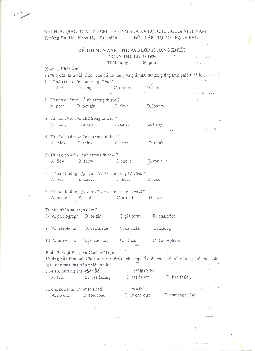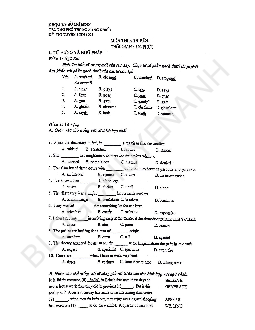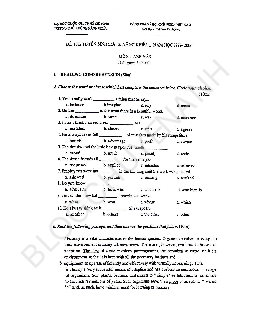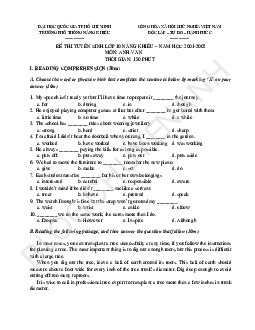






Preview text:
SỞ SÓC TRĂNG
A. PRONUNCIATION (0.8 point)
Part 1. Choose a word whose underlined part is pronounced differently from the others. (0.4 point) 1. A. polluted B. composed C. provided D. prevented A. pəˈluːtɪd B. kəmˈpoʊzd C. prəˈvaɪdɪd D. prɪˈventɪd 2. A. books B. stops C. points D. joins A.bʊks B. stɑːps C. pɔɪnts D. dʒɔɪnz
Part 2. Choose a word whose main stress position is different front the others. (0.4 point) 3. A. reduce B. pollute C. suggest D. gather A. rɪˈduːs B. pəˈluːt C. səˈdʒest D. ˈɡæðɚr 4. A. expensive B. important C. popular D. exciting A. ɪkˈspensɪv B. ɪmˈpɔːrtənt C. ˈpɑːpjəlɚr D. ɪkˈsaɪt̬ɪŋ
B. GRAMMAR - VOCABULARY - CONVERSATION EXCHANGES (5.4 points)
Part 1. Choose the word or phrase that best completes each of the following sentences. (4.2 points)
5. John didn’t go to the cinema yesterday, ______? A. did he B. does he C. didn’t he D. doesn’t he ●
Cấu trúc câu hỏi đuôi: đông từ chính “didn’t go” --> did he
6. This car ______ by my father last year. A. is bought B. was bought C. will be bought D. has been bought ●
Cấu trúc câu bị động: S + be( chia) + V3/ed + by 0 ( S:đối tượng bị tác động bởi hành động)
7. He used to ______ in a bank, but now he is working as a designer. A. working B. work C. be working D. worked
Used to do smt: đã từng làm gì
8. My brother was born ______ 2000. A. on B. in C. at D. between ●
“In” là cụm từ được dùng kèm với các cụm từ chỉ thời gian để nói về một khoảng chung
chung thiên niên kỷ, thập kỷ, trong năm, trong tháng, trong tuần, trong ngày,…
9. John is the ______ boy in my class. A. tall B. taller C. more taller D. tallest ● Cấu trúc So sánh nhất ●
Tính từ ngắn: S + V + the + adj + EST …. ●
Tính từ dài: S + V + the MOST + adj …
10. Can you ______ the television? I'd like to watch the news. A. turn off B. turn over C. turn on D. turn down ●
Turn off (phr verb): đóng, ngắt ( TV, máy lạnh, đèn…) ●
Turn over (phr verb): lật lên ●
Turn on (phr verb): mở, bật ( TV, máy lạnh, đèn…) ●
Turn down (phr verb): từ chối
11. My mother enjoys ______ a sandwich for her breakfast. A. having B. to have C. have D. has ●
Enjoy doing smt: thích làm gì
12. Last week, I unexpectedly ______ Lan in the supermarket. A. met B. have met C. meet D. am meeting ●
Unexpectedly /ˌʌnɪkˈspektɪdli/ (adv): Bất ngờ, thình lình, đột xuất; gây ngạc nhiên,tình cờ
13. My father ______ for this company since last year. A. is working B. works C. has worked D. worked
14. Nam asked me if I ______ my grandparents the following day. A. visit B. will visit C. have visited D. would visit ●
Câu tường thuật với if loại (Yes - No questions) ●
S+ asked+ O+ if + S + V( lùi thì)
15. My parents like sports. They love swimming ______ playing table tennis. A. Nor cũng không B. but nhưng C. or hoặc D. and và
16. The shops were closed. ______, I didn’t get any food. A. However B. So C. But D. Therefore ● However: tuy nhiên ●
So: do đó ( thường đứng giữa hai mệnh đề, sau dấu phấy) ● But: nhưng ●
Therefore: do đó (thường đứng đầu câu)
17. My teacher suggested ______ face masks in public. A. wearing B. wear C. to wear D. to wearing ●
Suggest doing smt: đề xuất, đề nghị ý tưởng/ việc làm
18. If it ______ tomorrow, we will not go to the cinema. A. rained B. was raining C. rains D. will rain ●
Cấu trúc câu điều kiện loại 1: if + S + V (simple present), S + will/can/shall + V
19. The boy ______ asked for your help yesterday is my cousin. A. who B. which C. where D. whom ●
Đại từ quan hệ “who ” thay thế cho “The boy”
20. The ______ of the volcano was a terrible disaster. A. prediction B. eruption C. cyclone D. shift ●
Prediction /prɪdɪkʃn/ (n): Sự dự báo, sự dự đoán; lời dự đoán, lời tiên tri ●
Eruption /i´rʌpʃən/ (n):Sự phun (núi lửa) ●
Cyclone /'saikloun/ (n): Lốc, gió xoáy ●
Shift /ʃift/ (n): Sự thay đổi (về vị trí, bản chất, hình dáng..)
21. How ______ sugar do you want? A. many B. much C. far D. often ●
How many được dùng khi bạn muốn hỏi về số lượng của thứ gì đó, áp dụng cho danh từ đếm được ●
How much được dùng khi bạn muốn hỏi về số lượng của thứ gì đó, áp dụng cho danh từ không đếm được
22. My uncle is living with my grandparents ______ the countryside. A. at B. in C. from D. on ●
In : trong, được dùng cho các địa điểm lớn như thế giới, châu lục, đất nước, tỉnh, thành phố, huyện, khu dân cư,…
23. Televisions, kitchen appliances, and other plugged-in appliances can consume ______ even when they're turned off. A. electricity B. resource C. solar D. bill ●
Electricity /ilek'trisiti/ (n): Điện, điện lực ●
Resource /ri'sɔ:rs/ (n): Phương sách, phương kế, thủ đoạn, cách xoay sở ●
Solar /soulə/ (n): (thuộc) mặt trời, có liên quan đến mặt trời ●
Bill (n): Hoá đơn, cước phí
24. Lan: “Why don't we go to Nha Trang this summer?”Tại sao chúng ta không đi Nha Trang
vào mùa hè này nhỉ? - Tam: “ ______”
A. It's nice of you to say so. Thật tuyệt khi bạn nói như vậy.
B. You're welcome.Không có chi. C. Well done. Tốt lắm.
D. That's a good idea.. Đó là một ý kiến hay. ●
Why don’t we + V: đề xuất ý tưởng/làm gì 25.
Tam: “What a beautiful dress!” thật là một chiếc váy đẹp ! 26. - Lan: “______” A.
You're welcome. Không có gì. B. Thank you. Cảm ơn bạn C. Yes, please. Có. làm ơn
D. Yes. I'd love to.Có. Tôi rất thích. ●
Cấu trúc câu cảm thán: What + a/ an + adj + danh từ số ít!
Part 2. Give the correct form of the words in brackets io complete each sentence. (0.6 point) 27.
They are very __INTERESTED__ (INTEREST) in caves and mountains in Quang Binh. ●
Interest /'ɪntrəst/ (n): Sự quan tâm, sự chú ý; điều quan tâm, điều chú ý ●
Interested /´intristid/ (a): Có quan tâm, thích thú, có chú ý 28.
The Internet is one of the most important ____INVENTIONS___ (INVENT) of our life. ●
Invent /in'vent/ (v): Phát minh, sáng chế ●
Invention /ɪnˈvɛnʃən/ (n): Sự phát minh, sự sáng chế; vật phát minh, vật sáng chế; sáng kiến 29.
YouTube is __WIDELY__ (WIDE) used by both teenagers and adults. ● Wide /waid/ (a): rộng lớn ●
Widely /waidli/ (adv): Rộng rãi, khắp nơi
Part 3. Choose the letter A, B, C, or D to indicate the underlined part that needs correction in
each of the following questions. (0.6 point)
29. Despite it rained heavily, we went to school on time. A B C D ● Despite --> although ●
Despite + noun = although + clause: mặc dù
30. Let's not go to die park if it will rain tomorrow. A B C D ● will rain --> rains ●
Cấu trúc câu điều kiện loại 1: if + S + V (simple present), S + will/can/shall + V
31. My sisters like getting up late in Sunday mornings. A B C D ● In --> on C. READING (2.0 points)
Part 1. Choose the letter A, B, Ct or D to indicate the correct word or phrases that best fits
each of the numbered blanks from 32 to 36. (1.0 point)
Tom Cruise is one of the most successful actors in cinema history. (32) ______ life hasn't always
been easy for him. As a young boy, Tom was shy and had difficulty in finding friends, although
he really enjoyed (33) ______ part in school plays. After he had finished High School, Tom went
to New York to look (34) ______ work. He found employment as a porter, and at the same time
he (35) ______ drama classes. In 1980, the film director Franco Zeffirelli offered Tom his first
part in a film. Ten years later, he had become (36) ______ successful that he was one of the
highest-paid actors in Hollywood, earning millions of dollars for each film. Today, Tom still
appears in films and is as popular as ever with his thousands of fans from all around the world.
( Source: Cambridge Preliminary English Test) 32. A. However B. Moreover C. Because D. Although 33. A. making B. taking C. holding D. finding 34. A. at B. up C. after D. for 35. A. prepared B. waited C. attended D. happened 36. A. so B. such C. too D. very 32. ● Moreover: hơn nữa ● Because: bởi vì ● Although: mặc dù ●
However: tuy nhiên (đứng đầu câu) 33. ● Enjoy doing: thích làm gì ●
Take part in (phr verb): tham gia ●
Look for (phr verb): tìm kiếm 35. ●
Prepare /pri´peə/ Sửa soạn, sắm sửa, chuẩn bị; sẵn sàng ● Wait (v): chừo đợi ●
Attend /əˈtɛnd/ Dự, có mặt ●
Happen/'hæpən/ (v): Xảy đến, xảy ra; ngẫu nhiên xảy ra, tình cờ xảy ra 36: ●
Cấu trúc: S + be/become + so + adj + that + S + V: quá..đến nỗi m
Part 2. Read the following passage and answer the questions from 37 to 41 with NO MORE
THAN SEVEN WORDS for each. (1.0 point)
The nineteenth-century inventor Margaret Knight was born in the USA in 1838. As a young girl,
she was made to work in a cotton factory by her parents. While she was working there, there was
an accident and somebody was almost killed by a machine. Margaret was only 12 at the lime, but
she invented a way to fix the machine so that if there was the same fault again, straight away the
machine would shut down completely.
She had more than eighty inventions, from a machine for cutting shoes to improvements for the
steam engine. But her most important invention - a machine that produced paper bags with fiat
bottoms – never made her much money. In fact, the idea for the original invention was stolen by
the person who made the model for the machine. She had to go through a long legal battle to be
finally recognized as the owner of the idea.
In those days, women were not encouraged to be business people any more than they were
encouraged to be inventors. Once Margaret Knight had produced an invention, she would usually
it to somebody fo not much cash, and when she died in 1914, all she left was 275 dollars.
(Source: PET Testbuilder)
37. What did Margaret Knight do?
→ Margaret Knight was an inventor ●
Key: The nineteenth-century inventor Margaret Knight was born in the USA in 1838
38. Where was she forced to work when she was a child?
→ She was forced to work in a cotton factory when she was a child. ●
Key: As a young girl, she was made to work in a cotton factory by her parents.
39. Could Margaret Knight's first invention save people’s lives? → Yes, it could. ●
Key: While she was working there, there was an accident and somebody was almost killed
by a machine. Margaret was only 12 at the lime, but she invented a way to fix the machine
so that if there was the same fault again, straight away the machine would shut down completely.
40. What was considered her most important invention?
→ Her most important inventor was a machine that produced paper bags with flat bottoms. ●
Key: But her most important invention - a machine that produced paper bags with fiat bottoms
41. When did Margaret Knight die? → She died in 1914. ● Key: and when she died in 1914 D. WRITING (1.8 points)
Part 1. Rewrite the following sentences in such a way that the second sentence has the same
meaning as the first one. (1.0 point)
42. Lan last wrote to Maryam two years ago.
→ Lan has not written to Maryam for two years.
● S + last + Ved/P2 + TIME + ago = S + have/has + not + Ved/p3 + for + TIME
43. You should water these flowers every morning.
→ These flowers should be watered every morning. ●
Cấu trúc câu bị động: S + be( chia) + V3/ed + by 0 ( S:đối tượng bị tác động bởi hành động)
44. I can’t speak Korean fluently.
→ I wish I could speak Korean fluently. ●
Câu ước: S + wish(es) + (that) + S + V-ed/were/p2
45. “I like this job,” said Lan.
→ Lan said that she liked that job. ●
Câu tường thuật: S + say(s) / said + (that) + S + V( lùi thì)
46. Peter doesn’t have enough money. He can’t buy a new house.
→ Were to have enough money, he could buy a new house. ●
Đảo ngữ câu đièu kiện loại 2: ●
If + S1 + V (quá khứ), S2 + would/might/could… + V (infinitive)
=> Were + S1 + (not) + O, S2 + would/might/could… + V (infinitive)
Part 2. Rewrite the following sentences, using the word given in brackets. (0.4 point)
47. My parents were very happy because I passed my exam. (SO)
→ I passed my exam so my parents were very happy. ● Because + clause: bởi vì ●
So: do đó (thường đứng giữa hai mệnh đề, sau dấu phẩy)
48. I live in a city. It is in the south of Vietnam. (WHICH)
→ I live in a city which is in the south of Vietnam. ●
Mệnh đề quan hệ: Đại từ quan hệ “which ” thay thế cho “a city”
Part 3. Rearrange the jumped words or phrases to make complete sentences. (0.4 point)
49. lovely/ I/ kitten/ have/ a./ → I have a lovely kitten.
50. the/ across/ at/ Walk/ the zebra/ street/ crossing./
→ Walk across the street at the zebra crossing ●
Zebra crossing: vạch qua đường cho người đi bộ --- THE END ---




